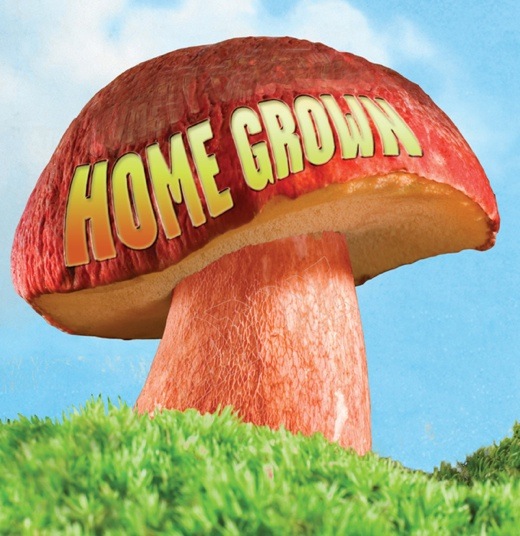 Image above: Modified poster for Comedy Central's 'Home Grown" show.
From (http://www.twistysdownload.com/forums/movies/14726-comedy-centrals-home-grown-2008-dvdrip-xvid-document.html)
By Arius Hopman on 28 March 2010 in The Garden Island News -
(http://thegardenisland.com/news/opinion/guest/article_868b14c0-3a2b-11df-a9cf-001cc4c002e0.html)
Image above: Modified poster for Comedy Central's 'Home Grown" show.
From (http://www.twistysdownload.com/forums/movies/14726-comedy-centrals-home-grown-2008-dvdrip-xvid-document.html)
By Arius Hopman on 28 March 2010 in The Garden Island News -
(http://thegardenisland.com/news/opinion/guest/article_868b14c0-3a2b-11df-a9cf-001cc4c002e0.html)
Kaua‘i is 90 percent dependent on imported food, and in the middle of the Pacific Ocean, it is vulnerable to increasing energy costs and a faltering tourist income.
Hawai‘i’s food prices have soared over the past few years. And they’re likely to go higher in the coming months, thanks to a major drought in California’s central valley,” according to an article by Alan Mcnaire called “Relying on California for Food.”
Our produce is often ten days old from Mainland farm to Kaua‘i table. The dollars we spend on imports are lost from our currency pool and can no longer be used to support our local economy. Easy tourist dollars have made us dangerously complacent.
Agroecology has many answers to the problem of unsustainable industrial farming, that has resulted in the loss of about 50 percent of agricultural soil world wide and depleted/polluted much of the remaining soil to virtual uselessness. Industrial farming is energy, water and chemical intensive, but agroecology works with the forces of nature, not against them.
“… human induced erosion and desertification [is] affecting 250 million people. In the first — and still most comprehensive — study of soil misuse, scientists at the International Soil Reference and Information Centre in the Netherlands estimated in 1991 that humankind has degraded more than 7.5 million square miles of land. Our species, in other words, is rapidly trashing an area the size of the United States and Canada combined,” according to the September 2008 issue of National Geographic Magazine.
About one billion people go hungry daily and thousands die each day of starvation. By definition, our unsustainable practices in all lifestyles will not last. We urgently need to research sustainable alternatives as we enter this new phase of history that has been called “the cascade of crises.” We are now approaching, or have already passed the peak of oil, the peak of cultivated food, peak of wild food (especially fish), peak of ground water, peak of soil fertility, peak of timber, peak of the ability of the environment to absorb our waste and toxicity etc. Now finally we may have the motivation to change our ways. The Kahili Agroecology Research Center is helping to pioneer a better way on Kaua‘i.
Based in science as well as years of experience of two main partners, KARC is launching an up-to-date series of tests to discover the optimal soil amendments, species, micro-organisms (including beneficial fungi and fertilizer-chelating bacteria) and intentional ecological relationships. The result of this research will be made available to other farmers and the public through a Web site, hands-on workshops, videos, presentations and a how-to manual. KARC is part of a word-wide pioneering effort toward not just sustainability but the ecological restoration of land fertility.
In Hawai‘i, import substitution has been identified as an important factor in the economic health of Hawai‘i, and food is the single most likely product to be developed for sale on Kaua‘i. At $2 billion/year of food imports, there is opportunity for an organic food market expansion.
Agroecology is a rapidly evolving system that blends permaculture, organic farming and French intensive raised-bed gardening with several new discoveries in soil fertility. “Terra Preta” or bio-char, that boosts soil fertility while permanently sequestering carbon, is an example. KARC will test just how effective biochar is. An innovation we add is to pre-inoculate the bio-char with several known beneficial microorganisms and fungi.
KARC, affiliated with Kaua‘i Community College, has a mission to discover how to restore soil fertility and optimize the organic farming of nutritious food plants and animals. With access to college level information and training, KARC is well positioned to contribute to Kaua‘i’s immediate farming needs. A proposal is available on request. We, who live in the middle of the Pacific, are especially vulnerable to global economic and energy fluctuations. We urgently need to diminish our dependency on imports. With four growing seasons per year and adequate sources of soil amendments and water, we have no serious physical obstructions to our quest. Our only limitation is our collective will to overcome the threshold of habit and (often institutional) inertia.
This new path is a creative risk that requires courage, initiative and financial support, so we can forge a new, safer, healthier and more sustainable way to produce our food. KARC will need about $70,000 to successfully launch this vital research project. We are at the cusp of a paradigm shift in sustainable food production. This investment in research is expected to have a strong multiplier effect on Kaua‘i, and possibly Hawai‘i and other tropical farming areas.
This project has been initiated with $10,000 and roughly five months of planning and hands-on work. Clearing of two acres is well under way, a water source is secured, live gliricidia fence posts have been planted and an electric fence purchased. The next step is the construction of a nursery and the installation of the test plots.
• Arius Hopman is a teacher for the food industry program at Kaua‘i Community College and is a certified permaculturist. He can be reached at ahopman@earthlink.net.
.
No comments :
Post a Comment